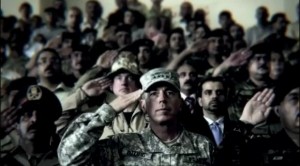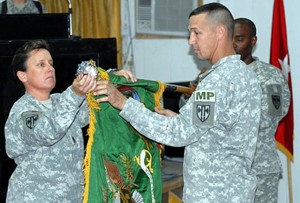
Petraeus salutes the death squads that advanced his career
Yesterday, the Guardian published an article detailing how the US turned to the use of death squads in Iraq to quell the rise of Sunni militias. The article provides convincing evidence that this was an intentional policy and was in fact a central tenet of David Petraeus’ often-praised counterinsurgency, or COIN, strategy. The key person in the Guardian’s reporting is James Steele, who was a veteran in organizing Central American death squads on behalf of the US during the Reagan years.
In reading the material from the Guardian, however, it should be kept in mind that Petraeus did not institute his COIN strategy only in Iraq. He put it into place in Afghanistan as well, and the fact that it lead to widespread allegations of torture and murder there demonstrates that the atrocities committed by these militias is a feature of the funding and training provided to them and not an unfortunate outgrowth, because this practice has now produced death squads in Central America, Iraq and Afghanistan. Recall that less than two weeks ago, Hamid Karzai called for the expulsion of US Special Operations forces from Maidan Wardak province due to allegations of abuse by the Afghan Local Police there. The Afghan Local Police are in reality groups of local militias trained and funded by US Special Operations forces and operating separately from the Karzai government. The ALP became one of the primary features of Petraeus’ COIN strategy when he moved it to Afghanistan.
Here’s the opening of the Guardian article:
The Pentagon sent a US veteran of the “dirty wars” in Central America to oversee sectarian police commando units in Iraq that set up secret detention and torture centres to get information from insurgents. These units conducted some of the worst acts of torture during the US occupation and accelerated the country’s descent into full-scale civil war.
Colonel James Steele was a 58-year-old retired special forces veteran when he was nominated by Donald Rumsfeld to help organise the paramilitaries in an attempt to quell a Sunni insurgency, an investigation by the Guardian and BBC Arabic shows.
Via email, my friend Kirk pointed out this report from Newsweek back in early 2005 where the concept of the Salvador option was floated openly by the Bush administration:
What to do about the deepening quagmire of Iraq? The Pentagon’s latest approach is being called “the Salvador option”–and the fact that it is being discussed at all is a measure of just how worried Donald Rumsfeld really is. “What everyone agrees is that we can’t just go on as we are,” one senior military officer told NEWSWEEK. “We have to find a way to take the offensive against the insurgents. Right now, we are playing defense. And we are losing.” Last November’s operation in Fallujah, most analysts agree, succeeded less in breaking “the back” of the insurgency–as Marine Gen. John Sattler optimistically declared at the time–than in spreading it out.
Now, NEWSWEEK has learned, the Pentagon is intensively debating an option that dates back to a still-secret strategy in the Reagan administration’s battle against the leftist guerrilla insurgency in El Salvador in the early 1980s. Then, faced with a losing war against Salvadoran rebels, the U.S. government funded or supported “nationalist” forces that allegedly included so-called death squads directed to hunt down and kill rebel leaders and sympathizers. Eventually the insurgency was quelled, and many U.S. conservatives consider the policy to have been a success–despite the deaths of innocent civilians and the subsequent Iran-Contra arms-for-hostages scandal. (Among the current administration officials who dealt with Central America back then is John Negroponte, who is today the U.S. ambassador to Iraq. Under Reagan, he was ambassador to Honduras. There is no evidence, however, that Negroponte knew anything about the Salvadoran death squads or the Iran-Contra scandal at the time. The Iraq ambassador, in a phone call to NEWSWEEK on Jan. 10, said he was not involved in military strategy in Iraq. He called the insertion of his name into this report “utterly gratuitous.”)
The most disgusting aspect of this apparent “trial balloon” floated by the Bush administration is that the program quite possibly was already underway when the Newsweek article came out. The Guardian article reminds us that Petraeus, the architect of this program, was sent to Iraq in June of 2004 (this was his second deployment to Iraq) to begin training Iraqis, and the Newsweek article wasn’t published until January of 2005. Steele, who was reporting directly to Rumsfeld, first went to Iraq in 2003 (Rumsfeld delighted in running his own people separately from the chain of command; he did this at times with McChrystal as well).
More evidence that the program was entirely intentional comes from the role of torture in the program and the moves the US made to ignore torture just as the program was put into place. Read more →


